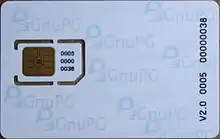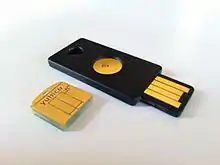

In cryptography, the OpenPGP card[1] is an ISO/IEC 7816-4, -8 compatible smart card[2] that is integrated with many OpenPGP functions. Using this smart card, various cryptographic tasks (encryption, decryption, digital signing/verification, authentication etc.) can be performed. It allows secure storage of secret key material; all versions of the protocol state, "Private keys and passwords cannot be read from the card with any command or function."[1][3] However, new key pairs may be loaded onto the card at any time, overwriting the existing ones.
The original OpenPGP card was built on BasicCard, and remains available at retail. Several mutually compatible JavaCard implementations of the OpenPGP Card's interface protocol are available as open source software and can be installed on generic JavaCard smart cards, including NFC-enabled cards.[4] Nitrokey[5] and Yubico provide USB tokens implementing the same protocol through smart card emulation.
The smart card daemon, in combination with the supported smart card readers,[6] as implemented in GnuPG, can be used for many cryptographic applications. With gpg-agent in GnuPG 2, an ssh-agent implementation using GnuPG, an OpenPGP card can be used for SSH authentication also.
Vendor IDs
An OpenPGP card features a unique serial number to allow software to ask for a specific card. Serial numbers are assigned on a vendor basis and vendors are registered with the FSFE.
Assigned vendor ids are:[7] [8]
| ID | Name | Assignation date | Comment |
|---|---|---|---|
| 0x0000 | Testcard | Specification | Reserved for testing. |
| 0x0001 | PPC Card Systems | Specification | |
| 0x0002 | Prism Payment Technologies | 2005-09-02 | |
| 0x0003 | OpenFortress Digital signatures | 2006-03-10 | |
| 0x0004 | Wewid AB | 2008-01-26 | |
| 0x0005 | ZeitControl cardsystems GmbH | 2009-06-02 | |
| 0x0006 | Yubico AB | 2012-11-15 | |
| 0x0007 | OpenKMS | 2014-01-20 | |
| 0x0008 | LogoEmail | 2014-11-03 | |
| 0x0009 | Fidesmo AB | 2015-10-21 | |
| 0x000A | Dangerous Things | 2016-03-12 | |
| 0x000B | Feitian Technologies | 2020-01-20 | |
| 0x002A | Magrathea | 2009-05-25 | |
| 0x0042 | GnuPG e.V. | 2017-11-01 | |
| 0x1337 | Warsaw Hackerspace | 2014-12-08 | |
| 0x2342 | warpzone e.V. | 2016-04-25 | |
| 0x4354 | Confidential Technologies | 2018-10-04 | |
| 0x5443 | TIF-IT e.V. | <= 2020-01-28 | |
| 0x63AF | Trustica s.r.o | 2018-04-05 | |
| 0xBA53 | c-base e.V. | 2020-03-03 | |
| 0xBD0E | Paranoidlabs | 2018-02-01 | |
| 0xF1D0 | CanoKeys | 2021-11-04 | |
| 0xF517 | Free Software Initiative of Japan | 2010-09-06 | |
| 0xF5EC | F-Secure | 2020-02-21 | |
| 0xFF00..FFFE | Random | Specification | Range reserved for randomly assigned serial numbers. |
| 0xFFFF | Testcard | Specification | Reserved for testing. |
References
- 1 2 OpenPGP Card specification - version 3.4.1, Achim Pietig, 2020. URL: https://gnupg.org/ftp/specs/OpenPGP-smart-card-application-3.4.1.pdf
- ↑ The OpenPGP Card - How to use the Fellowship Smartcard - The GnuPG Smartcard HOWTO, Rebecca Ehlers, Thorsten Ehlers, et al., Free Software Foundation Europe e. V., 2005. URL: http://www.gnupg.org/howtos/card-howto/en/ch01.html#id2472312
- ↑ OpenPGP Card specification - version 1.1, Achim Pietig, PPC Card Systems GmbH, 2004. URL: http://www.g10code.com/docs/openpgp-card-1.1.pdf
- ↑ Nathan Willis (August 3, 2016). "Free software and smartcards". LWN.net.
- ↑ Nitrokey, https://www.nitrokey.com/
- ↑ Required Hardware - How to use the Fellowship Smartcard - The GnuPG Smartcard HOWTO, Rebecca Ehlers, Thorsten Ehlers, et al., Free Software Foundation Europe e. V., 2005. URL: http://www.gnupg.org/howtos/card-howto/en/ch02s02.html#id2519120
- ↑ OpenPGP Card Vendors. Backup URL: https://web.archive.org/web/20181115153825/https://git.gnupg.org/cgi-bin/gitweb.cgi?p=gnupg-verein.git;a=blob;f=office/misc/OpenPGP-Card-Vendors
- ↑ OpenPGP Card Vendors. https://git.gnupg.org/cgi-bin/gitweb.cgi?p=gnupg.git;a=blob;f=scd/app-openpgp.c;h=e1ceed4bc62e41ccef1bec45561ffa5509e70d3a;hb=HEAD#l294
